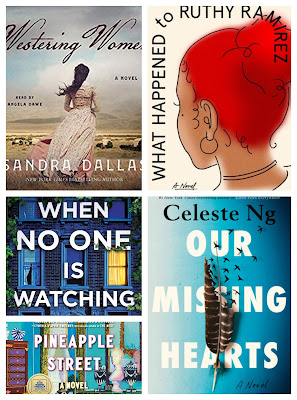 A Well-Trained Wife: My Escape from Christian Patriarchy by Tia Levings
A Well-Trained Wife: My Escape from Christian Patriarchy by Tia LevingsMy rating: 5 of 5 stars
Let me start like this: Tia Levings is my friend. You can find my husband and me in the acknowledgements. (I’ve already thanked Tia for her parenthetical “no relation to the Smalls in the story” because we are sure as heck not them!) Can I say, then, that this is an unbiased review? Probably not, but I can certainly say it is an honest review. (Thanks to Tia and St. Martin’s Press for the review copy.) And I can say without hesitation that Tia’s story is is incredibly timely in today’s cultural and political climate (hello, religious "tradwives" and Christian nationalists)—and that Tia is a gorgeous writer.
A Well-Trained Wife is Tia’s story of growing up in a high-control church that preached utter submission and denial of self—that used fear as its primary means of control. Do something bad, and you’ll burn in hell with the “decapitated liars and baby killers.” Follow all the rules—ALL of them— and you won’t be left behind. Keep your legs crossed, marry a good man, and be his "help-meet" forever by submitting to him utterly—and willingly. And you’ll be saved.
In the first half of her memoir, Tia weaves the story of the twisted seeds her fundamentalist leaders in Florida planted and nourished in her young mind and her subsequent marriage to a violent man, "Allan." Red flags? Sure, she saw them and wondered about them, but clearly marrying him would make “so many people happy” and prove her value. To say it was difficult to read this section is an understatement. The physical, sexual, emotional, and spiritual abuse Tia endured is horrifying and enraging. I wanted to pull young Tia and her babies out of all of this. In the second half of the book, “Allan” abruptly moves the family to Tennessee and tells Tia “‘you’re going to like it there.'"
When Tia and her four red-heads came to Tennessee, we immediately bonded. What I recognized in Tia from the moment I met her was her soul—she, a fellow “mother writer artist hiker friend.” What I didn’t recognize was that she was trapped and terrified: married to a dangerous man and held captive by a lifetime of warped and dangerous theology.
(My husband remembers that our youngest son and his friend, probably around six years old, threw sand at Allan when he was at our house one afternoon. Throwing sand was not in these boys’ nature at all. I like to think they sensed who Allan was beneath his veneer of Nice Family Guy. I wish we’d had the same instinct.)
Tia hid it well. We had no idea what was going on. We had no idea of Tia’s experiences in a fundamentalist world in Jacksonville. I knew they’d moved here because of a certain church, but I didn’t know anything about that church or its belief system. I probably just heard “Presbyterian,” which brings to my mind oiled wooden pews and old stone churches. How far, how very far from that was this “church of covenanters” who rejoiced at the chilling declaration: “’With patriarchy comes hierarchy.’” As Tia writes, “mainstream Christians… wouldn’t guess zealous Presbyterians were raising future politicians with dominionist theology.” The patriarchs were in control, and Tia inwardly recoiled while outwardly submitting. She was, after all, “a patriarch’s wife.”
When Tia and the family moved over an hour north from our city to the Blue House, we thought it was all about having their own home. Having more space. Having chickens and such. But the tiny town itself—if you can call it a town—was depressing. Sad and oppressive in a way that could suck the life out of anyone. And more than anything else: it was isolating—and the patriarchy knew it when they moved them there.
How Tia discovered herself—how she clung to the light within her even as she was reminded that women “‘aren’t called to be individuals’”—is remarkable. But read her story yourself. And keep in mind, as you read, that Tia’s experiences in a high-control religion are less fringe that you think. As Tia writes to those hiding in plain sight, “let’s keep flipping on that light switch and flooding these darkened rooms.” And consider this book a warning, too: a large portion of the U.S. wants our country to look like these darkened rooms where women stand quietly in corners with their heads bowed in submission.
To read about Tia’s real life makes me want to turn back time to when we sat together in bright green parks chatting while our kids played. How I wish I could hold that Tia’s hands and tell her that Allan and his gang of men are full of $hit and she is worthy of all the happiness, all the success, and all the freedom.
Can't wait for Tia's next book.
Warnings: sexual assault/rape, domestic violence, religious trauma, infant death, severe misogyny
View all my reviews








